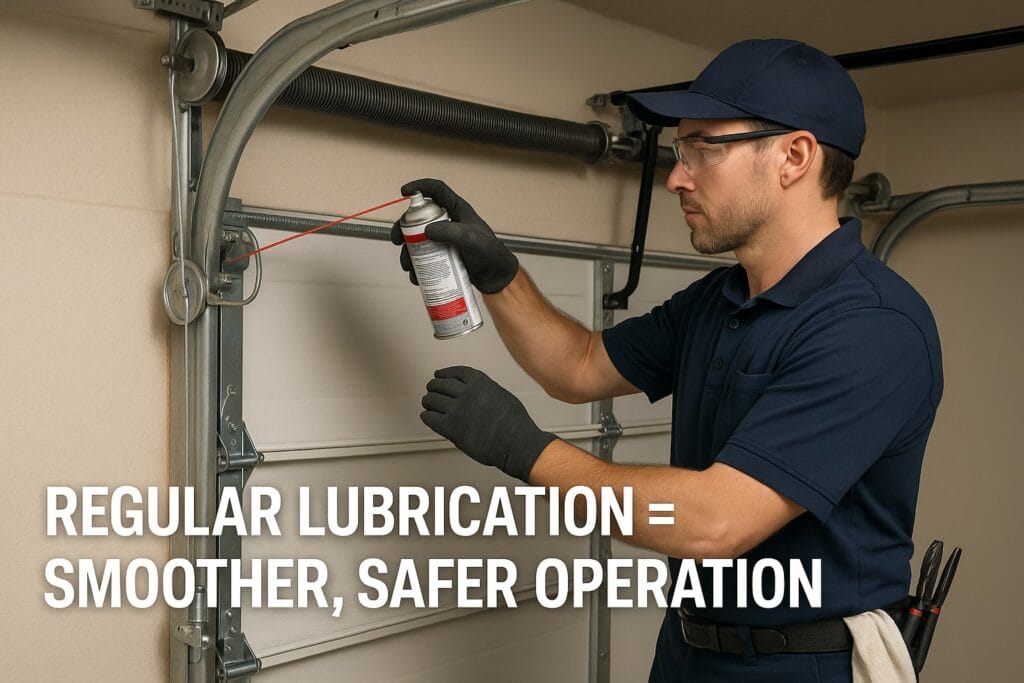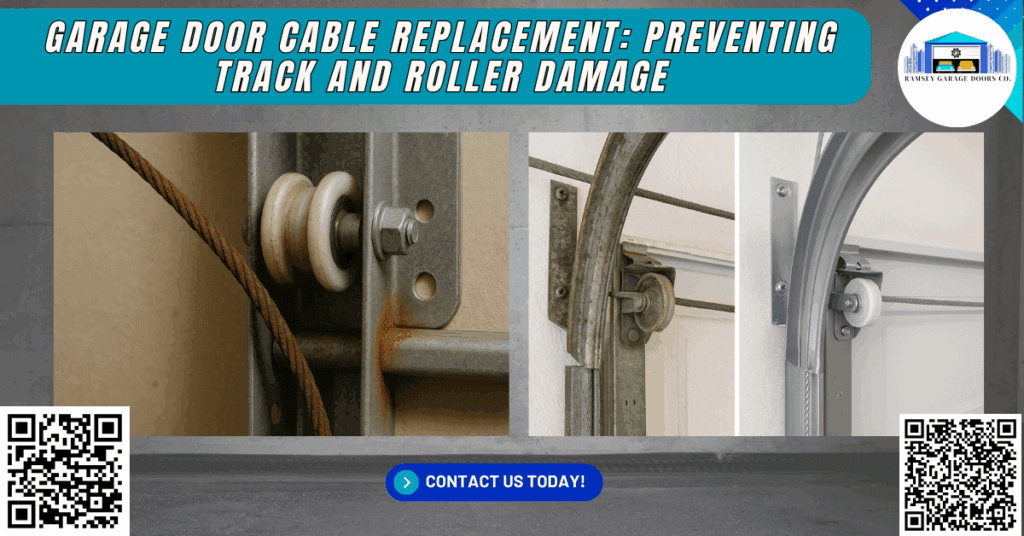Why Garage Door Cables Should Never Be Ignored
A recent customer in Austin called us in a panic. Their garage door had come off its tracks completely, leaving their car trapped inside. Upon inspection, we discovered a frayed cable had finally snapped, causing the heavy door to drop unevenly. This put immense strain on the door rollers and bent the tracks beyond repair. What started as a small issue with worn garage door parts became a significant repair project, costing much more than simple preventive maintenance would have.
The reality is, garage door cables are essential components that work together with the entire system, including tracks, rollers, springs, and opener, to keep your door functioning properly. According to industry reports, over 25% of garage door failures stem from cable problems that escalate into more severe damage if ignored. Whether it’s a broken garage door spring, a worn-out cable, or deteriorated tracks, these small issues can impact your whole garage door system.
At Ramsey Garage Doors Co., we’ve serviced hundreds of homes and businesses across Austin. We’ve seen how neglecting key garage door parts, especially cables, can lead to expensive and dangerous situations. If you want to keep your door operating safely and protect your investment, understanding how cables interact with other components is vital.
How Garage Door Cables Integrate with Other Garage Door Parts
Garage doors are intricate systems comprised of many interconnected parts and components, each playing a crucial role. The garage door cables are not merely accessories; they are fundamental to how the door operates. These cables, made from high-tensile steel strands, work alongside torsion springs or extension springs to control the smooth lifting and lowering of your door. Together with other precision garage door parts such as the garage door rollers, hinges, tracks, and brackets, they ensure your system functions efficiently.
The Role of Cables in Garage Door Systems
- Weight Distribution & Balance
The cables wrap around cable drums, helping to distribute the door’s weight evenly across the tracks. This reduces stress on the garage door springs and prolongs the lifespan of all related components. - Prevention of Sudden Drops
If a spring fails or loses tension, cables provide backup support to prevent the door from crashing down unexpectedly, protecting people, property, and vehicles. - Support for Openers
The garage door opener relies on cables to reduce the load it must bear. A balanced door with well-maintained cables ensures the opener doesn’t work harder than it should, preserving its motor.
When cables weaken, fray, or snap, the door becomes unstable, putting excess strain on the tracks, rollers, hinges, and springs. This can lead to structural damage not only to your garage door but also to your home’s framing and foundation.
Types of Garage Door Cables and Their Differences
There are generally two main types of cables used in garage doors: torsion spring cables and extension spring cables.
- Torsion spring cables are designed to work with systems that utilize a torsion bar mounted above the garage door. These are common in heavier residential and commercial doors.
- Extension spring cables, on the other hand, are paired with systems that use springs running alongside the horizontal tracks.
Each type has unique tension requirements and compatibility with various garage door systems.
Understanding which type of cable your door requires is essential for ensuring compatibility and performance. A mismatch between cables and springs can lead to early failure, unnecessary strain on the garage door operator, and compromised safety.
Signs Your Garage Door Cables Need Immediate Attention
Being proactive about cable maintenance can save you from costly repairs. Here are some common signs that your cables or other connected garage door parts are in trouble.
1. Frayed or Rusty Cables
Inspect your cables regularly. If you notice fraying wires, rust buildup, or kinks, this indicates structural weakening. Rust compromises the cable’s strength, and frays increase the risk of snapping. These are clear signs that replacement is necessary.
2. Door Hanging Unevenly
If one side of the door hangs lower than the other or if it opens at an angle, it likely points to a failed or slipping cable. This causes imbalanced tension and can quickly lead to bent tracks and dislodged rollers.
3. Slow or Jerky Door Movement
A garage door should operate smoothly and quietly. If it hesitates, jerks, or moves inconsistently, it may be struggling against uneven weight distribution caused by worn cables.
4. Noises During Operation
Grinding, squeaking, or popping sounds often come from cables rubbing against other parts or slipping on the cable drum. These noises signal that it’s time to call in a professional for inspection and possible replacement.
5. Sagging Garage Door Panels
Over time, cables that lose tension can cause the entire garage door to sag or bulge outward at the bottom. This visual cue often indicates that the cables have stretched beyond their service limits and require immediate attention.
How Cable Failure Leads to Track and Roller Damage
The cables are integral to the door’s stability. When they fail, the effects ripple through the entire system. Here’s how ignored cable problems can spiral into expensive repairs.
1. Warped Tracks
Cables distribute weight evenly. When they snap, one side of the door bears disproportionate weight, causing the metal tracks to bend, warp, or detach from the garage frame. Tracks support the door’s vertical and horizontal movement, and once damaged, they compromise the system’s safety and efficiency.
2. Dislodged Rollers
Without properly functioning cables guiding the door, the door rollers can pop out of the track. This not only halts operation but may cause permanent deformation of the rollers, requiring full replacement.
3. Damage to Other Garage Door Parts
A domino effect ensues as garage door hinges bend, torsion springs strain, and garage door panels twist. These damaged components weaken the door’s structure and aesthetics, necessitating extensive repairs or replacement.
4. Increased Risk of Panel Damage
The stress from imbalanced movement often leads to visible dents, cracks, or warping in door panels. Whether your door is wood, metal, or composite, these damages reduce curb appeal, energy efficiency, and security.
5. Impact on Garage Door Openers
When cables fail, the garage door opener may attempt to compensate for the imbalance. This can strain the motor, gears, and belts, leading to premature failure of the opener itself.
Why Maintenance Across All Garage Door Parts is Essential
Your garage door isn’t just a single entity; it’s a complex machine, a fabrication of precision parts, each requiring regular attention. Components such as garage door openers, torsion springs, extension springs, rollers, brackets, and hinges must work together harmoniously.
Think of it like the gears in a clock or the parts of a CNC machine. When one part malfunctions, it affects the others. Ignoring small issues like frayed cables can escalate into failures across the garage door operator, tracks, rollers, and weather seals. Consistent professional maintenance, using the right lubricant grease and adjustments, ensures all parts from decorative carriage house windows to smart garage kits remain in optimal condition.
Actionable Steps to Protect Your Track and Rollers from Damage
1. Schedule Routine Inspections and Maintenance
Professional inspections help detect early signs of wear on garage door parts such as cables, garage door springs, and rollers. A maintenance plan with Ramsey Garage Doors Co. includes checking all components for alignment, balance, and wear.
2. Monitor for Changes in Operation
Stay vigilant. If you hear unusual noises or notice changes in how your door moves, act quickly. Early intervention prevents minor issues from becoming system-wide failures.
3. Avoid DIY Repairs on High-Tension Components
Garage door springs and cables carry extreme tension. Attempting to replace them without professional tools and training can lead to serious injury. Always rely on certified technicians for these tasks.
4. Replace Related Parts Together
When replacing cables, consider inspecting and upgrading related parts such as rollers, hinges, tracks, and brackets. This holistic approach ensures the entire system operates as designed, extending its lifespan and maintaining energy efficiency.
5. Maintain Proper Lubrication
Use high-quality lubricant grease specifically designed for garage door systems. Lubricate rollers, hinges, and springs at least twice a year to ensure smooth operation and minimize friction-related wear.
Consequences of Delaying Cable Replacement
Ignoring failing cables leads to broader, more expensive issues. Here’s what’s at stake.
- Property Damage: A detached door can destroy garage door windows, damage garage door panels, or harm vehicles.
- Injury Risks: A sudden door drop can cause serious injuries or even fatalities.
- Higher Costs: Replacing a bent track or a full door is far more expensive than preventive cable maintenance.
- Security Vulnerabilities: A malfunctioning garage door compromises home security, making it easier for break-ins.
- Decreased Energy Efficiency: A misaligned or sagging door leads to gaps that allow drafts and moisture, reducing your home’s energy efficiency.
Professional Solutions in Austin, TX by Ramsey Garage Doors Co.
At Ramsey Garage Doors Co., we approach garage door cable replacement with precision and care, using the best fabrication and machining techniques to ensure your system’s longevity. Our services cover residential and commercial properties throughout Austin, TX, providing solutions for every garage door make and model.
Our Process Includes
- Comprehensive inspection of garage door parts
- Safe removal and replacement of cables, rollers, and brackets
- Testing for proper balance and smooth function
- Fine-tuning of torsion spring tension
- Recommendations for future maintenance and care
We use high-quality components and systems, compliant with modern industry standards and safety codes. Whether it’s a commercial door, residential opener, or decorative garage door window, we deliver durable solutions.
How to Extend the Life of Your Garage Door Parts
Maintaining your garage door means more than emergency repairs. Proper care extends the life of your garage door parts and saves money long-term.
Maintenance Tips
- Lubricate rollers, hinges, and springs every six months with appropriate lubricant grease
- Inspect cables and torsion springs seasonally for signs of wear or corrosion
- Clean tracks regularly to prevent debris buildup
- Replace worn weather seals to maintain insulation and energy efficiency
- Schedule annual professional inspections to stay ahead of potential problems

Consistent care protects your investment and ensures safe, reliable operation for years to come.
How Can Ramsey Garage Doors Co. Help You
At Ramsey Garage Doors Co., our mission is to keep Austin homeowners and businesses safe by ensuring their garage door parts operate flawlessly. Whether you need a full garage door cable replacement, a system inspection, or advice on upgrading to smart garage systems, our experienced team is here to help.
Why Choose Us
- Fast, reliable service backed by years of industry experience
- Expertise in both residential and commercial garage doors
- Access to high-quality, durable garage door components
- Transparent pricing with no hidden fees
- Same-day emergency service options are available
Don’t let a minor cable issue turn into a major problem. Contact us today or book online to protect your garage door’s longevity and your family’s safety.
Address: 5502 Burnet Rd, Austin, TX 78756
Phone: (512) 675-6884
Final Thoughts: Protect Your Home with Proactive Care
Your garage door is more than just an entry point; it’s a complex machine built from precision components and systems. Proper care of your garage door parts, especially your cables, protects not just the door itself but your entire home and everything inside it. From torsion springs to garage door openers, every part plays a crucial role in performance and safety.
By scheduling regular maintenance with trusted professionals like Ramsey Garage Doors Co., you’re investing in your property’s value, security, and longevity. Don’t wait for the signs of failure; be proactive, and your garage door will serve you reliably for years to come.
For expert advice, comprehensive service, and peace of mind, trust Ramsey Garage Doors Co., Austin’s choice for garage door excellence.
Frequently Asked Questions (FAQs)
1. How long do garage door cables typically last?
Garage door cables usually last between 8 to 15 years, depending on usage, climate, and whether regular maintenance is performed. Frequent use and exposure to moisture can shorten their lifespan.
2. Can I replace garage door cables myself?
It’s not recommended to replace garage door cables yourself because they are under high tension and can cause serious injury. Always hire a trained professional to ensure safe and proper installation.
3. What type of lubricant should I use for my garage door cables?
Use a high-quality silicone-based or lithium-based garage door lubricant for cables and related moving parts. Avoid household oils like WD-40, which are not designed for long-term lubrication.
4. Do frayed garage door cables always need to be replaced immediately?
Yes, even minor fraying is a sign that the cable is compromised and should be replaced as soon as possible. Delaying can lead to sudden failure, causing safety risks and potential damage to other parts.

